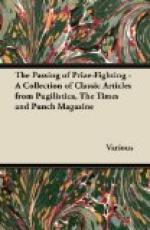Thursday, May 15th.—The intelligent foreigner who should try to disentangle the causes of Egyptian unrest from the speeches delivered in both Houses this afternoon will be rather puzzled. From Captain WEDGWOOD BENN in the Commons he would learn that it was due to the ineptitude of the British Administration, the ill-treatment of the natives by the Army of Occupation, and in particular the unsympathetic attitude adopted by Lord CURZON towards the Nationalist leaders, one of whom, according to Captain BENN, “held in Egypt a position comparable with that of Mr. Speaker here.” Across the corridor at the very same moment Lord CURZON was asserting that Egypt was enjoying extraordinary material prosperity, that the British soldiery had shown wonderful restraint in very trying circumstances and that the Government had not the least desire to repress Egyptian individuality (when not too exuberant, of course) or deny to natives an ever-increasing share in the administration of their country. They would have been quite ready to listen to ZAGHLUL and his friends if they had not begun by demanding the complete disappearance of British rule. The intelligent foreigner will probably come to the conclusion that Egypt is very like Ireland—except that it has no Ulster.
General SEELY gave a fairly plausible explanation of the apparently wanton destruction of new aeroplanes that is going on at Farnborough and elsewhere. Owing to the rapid progress in aviation they were already obsolete for military purposes before they were delivered. They are quite unsuitable for civilian use, and are therefore being “reduced to produce”—a euphemism for “scrapped.”
Mr. SHORTT was not in his place, but the interests of the Home Department did not suffer in the hands of the Under-Secretary. Sir HAMAR GEEENWOOD rattles out his replies with the speed and accuracy of a machine-gun, and has a neat formula for dealing with “supplementaries”: “All these further Questions are covered by my original answer.”
* * * * *
“But in course of time sympathetic Americans and the other tribes will be searching the ruins of burned-out passions and agonies, armed with the rewritten Badaeker or its Allied equivalent.”—Manchester Guardian.
The re-writing seems to have begun already.
* * * * *
[Illustration: The Muzzled One. “TAKE MY TIP, YOUNG FELLER, AND HOP IT—QUICK. THERE’S A COPPER COMING.”]
* * * * *
MORE MUSICAL RECONSTRUCTION.
(By our Special Reporter, who is also busy with the Coal Commission.)
At the three hundred and seventeenth sitting of the Musical Reconstruction Commission Mr. Justice Bland, the President, said he felt sure he would be voicing the feelings of all present in tendering his congratulations to Sir Leonardo Spaghetti Coyne on his elevation to the peerage as Viscount Vermicelli of Milan, and to Mr. Gladney Jebb on receiving the honour of K.P.O. (Knight of the Proletarian Order).




